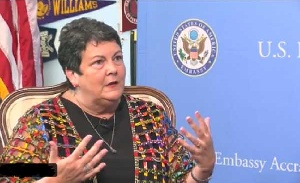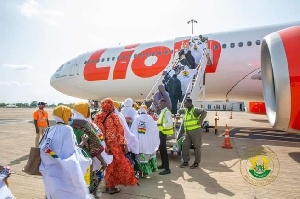Business News of Monday, 7 April 2025
Source: www.ghanawebbers.com
Payment delays put investment climate at risk - U.S. warns
Ambassador Palmer spoke to journalists in Accra about financial risks. She highlighted the dangers of not paying for services and projects. This is especially true for sectors that rely on international financing.
Palmer noted that non-payment affects Ghana's sovereign credit rating. The Development Finance Corporation (DFC) has nearly a billion dollars invested in Ghana. However, it is hesitant to engage in new projects with the government.
Concerns about Ghana’s financial commitments have increased recently. By December 2024, the country’s debt reached GH¢726.7 billion, up from GH¢610 billion in 2023. Almost 40 percent of this debt is external.
Ghana faced sharp rating downgrades in 2022 and 2023. The Domestic Debt Exchange Programme (DDEP) further damaged investor confidence. During the 2025 budget presentation, Finance Minister Dr. Casiel Ato Forson revealed payments of approximately GH¢150.3 billion over four years.
Ghana also has significant external debt service commitments totaling US$8.7 billion during this period. This amount equals 10.9 percent of GDP and peaks in 2027 and 2028, creating potential fiscal pressures.
Senator James E. Risch from the U.S. Senate Committee on Foreign Relations took action regarding Ghana's debts to U.S companies. He suggested that these repayments should be a condition for U.S support under the current US$3 billion IMF program.
Ambassador Palmer emphasized that delayed payments impact investor decisions significantly. New investors often consult their networks before investing in Ghana, she said.
She explained that companies cannot face shareholders with large liabilities due to unpaid debts. This situation discourages further investments, but the Ghanaian government is open to solutions.
The U.S remains a key economic partner for Ghana, with bilateral trade valued at around US$2.1 billion in 2024. However, DFC's reluctance highlights challenges within Ghana’s investment climate.
Palmer mentioned a partnership between U.S nuclear firm NuScale and Regnum to develop small modular reactors in Ghana's energy sector. Success depends on financing models that do not require direct government guarantees.
These reactors are safer and more cost-effective than traditional plants, according to Palmer. The financing model allows an off-taker to pay for generated energy instead of relying on government funds.
Industry stakeholders urge immediate action to restore confidence in contract enforcement mechanisms in Ghana. Business associations have called for prioritizing outstanding arrears owed to contractors and service providers.
A report by the Ghana National Chamber of Commerce warned that contractual breaches harm both foreign and local businesses reliant on timely payments from the state.
Ambassador Palmer’s comments reflect concerns from local industry players about contract sanctity being vital for economic recovery in Ghana.
The government has not yet formally responded to her remarks but has assured efforts are underway to improve payment structures and resolve debts.
The Ministry of Finance aims to strengthen fiscal discipline as part of its ongoing IMF-backed economic reform program.











